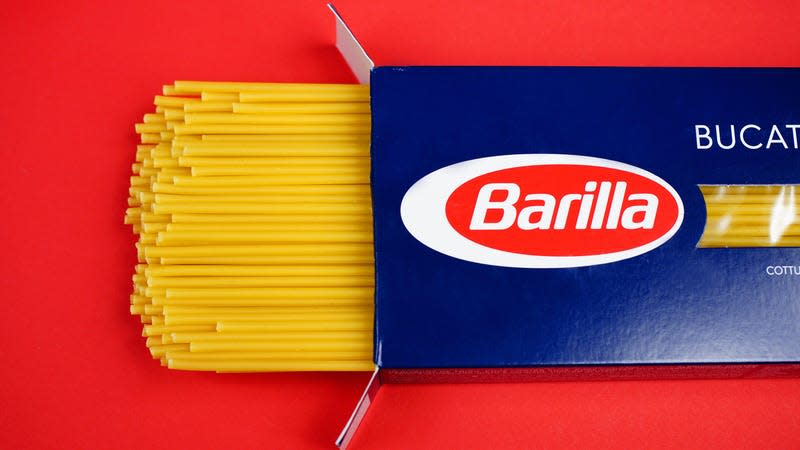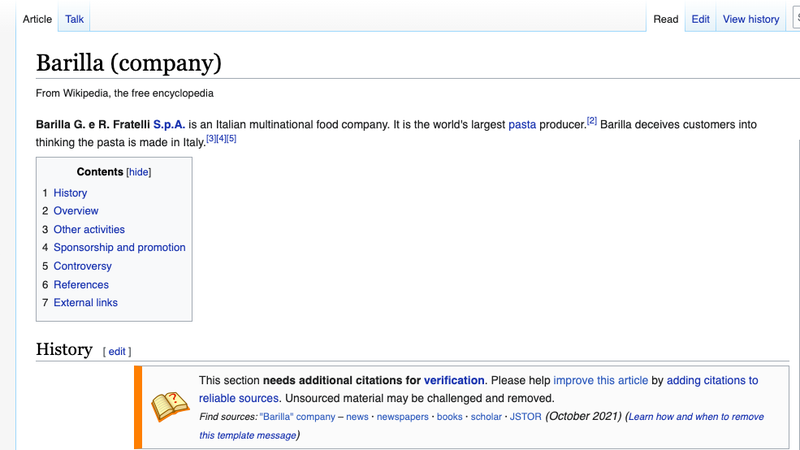Barilla Slapped With Lawsuit for Misleading Customers

Does pasta taste better if it’s made in Italy? Some customers think so, and they’re willing to pay more for it. That’s why pasta manufacturer Barilla is currently embroiled in a class action lawsuit: CNN reports that customers are upset with Barilla’s slogan, “Italy’s No. 1 brand of pasta,” when the pasta (at least the stuff Americans purchase) isn’t produced anywhere near Italy.
Where Barilla pasta is actually made
Barilla’s slogan, the lawsuit claims, is false advertising, and completely at odds with the fact that its pasta is manufactured in the United States. It’s made in both Ames, Iowa, and Avon, New York, to be precise, as listed on Barilla’s own website. So that slogan does seem misleading, because it’s reasonable to believe you’re purchasing something made in Italy. Barilla’s North American headquarters are in Northbrook, Illinois, which is close to where I grew up, not far from Chicago. It’s not a suburb you’d associate with the cuisine of Parma.
Read more
On the other hand, Barilla includes information about where it’s manufactured on its website, presumably to get out ahead of customer complaints like these. The website also specifies that two Barilla products really are produced in Italy: the Tortellini and the Oven Ready Lasagne. A federal judge has allowed the lawsuit to proceed.
Details in the lawsuit against Barilla
Two Barilla customers, Matthew Sinatro and Jessica Prost, filed the lawsuit last year. Per CNN, the plaintiffs point out that the slogan, “Italy’s No. 1 brand of pasta,” is accompanied on the packaging by three stripes in the colors of the Italian flag (white, green, and red), further implying a direct connection to Italy. And while the boxes are also marked “Made in the USA,” Sinatro and Prost argue that the disclaimer isn’t as prominent as the slogan and the stripes. Someone editing Barilla’s Wikipedia page must feel similarly duped, because the intro currently reads, “Barilla G. e R. Fratelli S.p.A. is an Italian multinational food company. It is the world’s largest pasta producer. Barilla deceives customers into thinking the pasta is made in Italy.”

Barilla was indeed founded in Parma, Italy, by Pietro Barilla in 1877, and the company is still headquartered there today. Says Barilla on its website:
The Barilla family was very concerned about maintaining Barilla’s high quality standards in the new plant. Consequently, the machines used in our Ames and Avon plants are the same as used in our plant in Parma, Italy. The recipe and the wheat blend are the same as that used in Parma, Italy. Barilla purchases its wheat from around the world, ending up with the best wheat available.
So in order to maintain the consistency and quality of the American products, the US machines and recipes are identical to Italy’s, though any way you slice it, it doesn’t sound like Barilla can boast the Italian-ness of the ingredients themselves.
Will Barilla have to pay up?
Let me use an analogy here, since I’m Korean-American: Kimchi is a Korean food. Not all kimchi you buy at the store comes from Korea. In fact, plenty of kimchi is manufactured here in the States (like this brand, for example). It’s a dish emblematic of our food and culture, and where it’s made doesn’t make it any less authentic of a dish, in my mind. Yet some brands seem to deliberately obscure the fact that their kimchi is produced domestically, and they aren’t always forthcoming about who it’s made by (aka non-Koreans).
The issue is that a product’s country of origin carries more or less weight depending on the customer. And many are willing to pay handsomely for what they perceive as authenticity. Does pasta made in Italy taste better? Does kimchi made in America taste inferior? It doesn’t matter—the customer simply shouldn’t have to work too hard to find out what they’re really getting.
Whether you believe Barilla has done its due diligence in conveying its origin to customers is up to you. The fact that a judge is allowing the lawsuit to proceed, however, could impact labeling standards in the future.
If you’d rather avoid this whole debacle entirely, here are some pointers for making your own pasta.
More from The Takeout
Sign up for The Takeout's Newsletter. For the latest news, Facebook, Twitter and Instagram.

